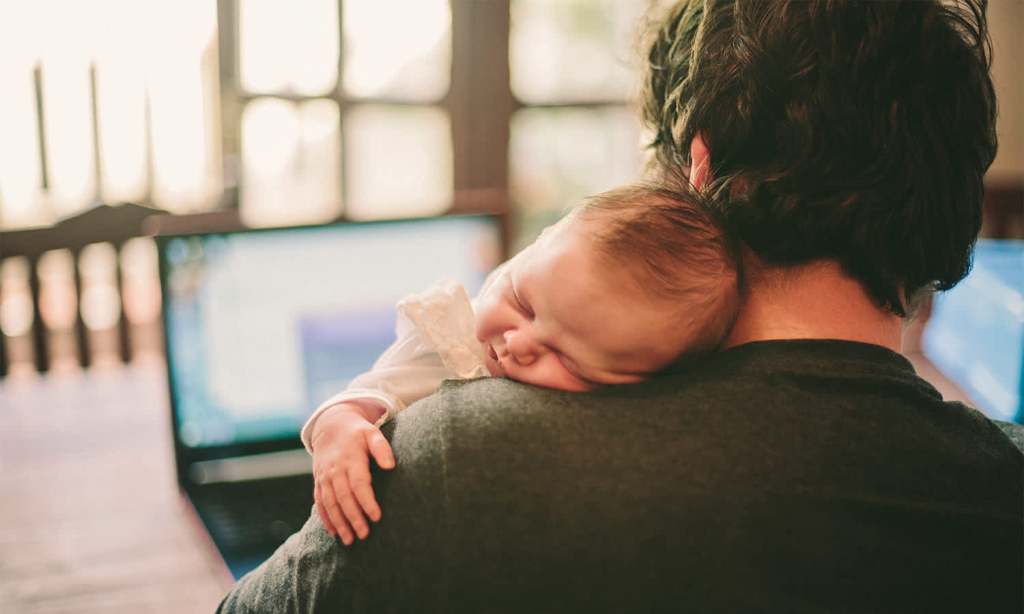Last month, right-wing opinion-haver Tucker Carlson laid into the US Transportation Secretary and first openly gay cabinet member, Pete Buttigieg, for taking paternity leave.
“Paternity leave, they call it; trying to figure out how to breastfeed. No word how that went,” said one of the most prominent conservative voices in America.
Candance Owens, another prominent right-wing critic, also leapt to the attack, saying that Buttigieg’s decision was “sickeningly pathetic” and that “Privileged times have produced the weakest men that have ever lived in America.”
You may remember Owens as the woman who recently called for the US military to invade Australia due to its “tyrannical” COVID regulations, comparing our leaders to Adolf Hitler and Joseph Stalin. No word from her on the comparison between COVID death rates, however.
While this type of debate rages in the far off fantasy land of the United States, it belies an understanding of paternity leave that seems to resonate with men in Australia.
Research from the University of South Australia has found that workplace culture and masculine norms are keeping fathers from asking for flexible working hours, including paid parental leave.
In investigating barriers and facilitators for men to access and use flexible work arrangements, lead researcher Dr Ashlee Borgkvist found that many fathers felt pressure from their organisations not to use flexibility for family reasons, with this sentiment also echoed across societal norms.
Australia has one of the lowest rates of fathers taking paid parental leave in the world, with fewer than one in every hundred recipients being a man.
Borgkvist has said that the low uptake of formal flexible working arrangements by Australian fathers is primarily due to a perceived, and quite often objective, lack of support from workplace managers and colleagues alike.
“Workplace flexibility is typically accepted as an option for mothers, but when it comes to dads, flexibility is unlikely to be as readily accepted – and in some cases not even considered,” Borgkvist said.
“Workplace and societal norms play a big role in the lack of flexibility for dads, with many men feeling pressure to conform to stereotypical concepts of the male ‘breadwinner’ – they’re applauded for earning the dollars to support their family but frowned upon if they consider flexibility to do the same.
“Concerningly, many new fathers feel they need to prove their commitment to the job by purposely avoiding flexibility, or in some instances, taking on more hours when they become a new father. They may also take on more hours because they are feeling financial pressures.”
This is a problem not only for the mental health of the dads involved but also because spending time with a father early on in a child’s life has been found to create bonds that they are more likely to maintain throughout the child’s life. In turn, this involved fathering can have positive outcomes for that child’s future.
Borgkvist says that while Australia’s national Paid Parental Leave scheme is gender-neutral and so can be used by mums or dads, the stigma of asking for flexibility, along with the need for mothers to utilise the whole Paid Parental Leave period, is limiting its uptake by dads. This can have a flow-on effect where dads don’t feel like they should be using flexibility as their children grow either.
“Some fathers are trying to be more flexible – say, for example, by coming into work late after dropping the kids at school – but they’re also very aware of the need to visibly minimise their time away from paid work. Of course, this can depend on the workplace, but even where workplaces have flexibility policies there is often an unspoken, or cultural, discouragement of dads taking time away from work for family reasons,” Borgkvist said.
“One father I spoke to said he’d stepped back from visiting schools with his wife and child because he felt he’d taken too much time off; another father said he wouldn’t ask for flexibility because he didn’t ‘want to be seen as ‘someone who tries to get out of doing work’.
“So, while the desire and need for flexible work hours is there, it’s being squashed by restrictive workplace cultures. As you can imagine, these ideas around flexible work also have impacts for how women who use flexibility are perceived within workplaces.”
In Australia, only two per cent of organisations have set targets to improve men’s participation in flexible work. And while COVID-19 provided an opportunity for businesses to trial flexible work, not all of those organisations appear ready to adopt this in the longer term, with some opting to ‘return to normal’ once working from home is no longer required.
“To initiate change in relation to dad’s use of flexibility, and parental leave, in particular, cultural change is vital. But this can only be achieved when we have strong social policies supported by business practice,” Borgkvist said.
“Evidence shows that when fathers are provided with well-compensated, targeted and extended parental leave, they are very likely to take it.
“Australia is very conservative when it comes to fathers and parental leave. Only when governments and businesses can commit to tangible and practical change will we see flexibility become a real option for Aussie dads.”
Read more stories from The Latch and subscribe to our email newsletter.

